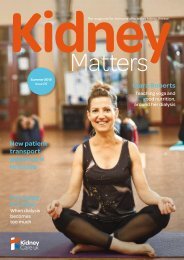Kidney Matters - Issue 12 Spring 2021
Kidney Matters is our free quarterly magazine for everyone affected by kidney disease. This issue includes a tribute to Kidney Care UK Chair of Trustees Professor Donal O'Donoghue who passed away due to covid-19 at the start of the year. There's also a feature on sex and relationships, how your views helped shape covid-19 national policy, medical articles on anaemia and simultaneous pancreas and kidney transplantation, and a feature interview with a transplant recipient on some of the social stigmas often faced by people with chronic health conditions within the Black, Asian and minority ethnic (BAME) community. As well as this, we'll be looking back at two years of the Kidney Kitchen as we cook up a tasty tandoori with guest chef and RNG dietitian, Gabby Ramlan.
Kidney Matters is our free quarterly magazine for everyone affected by kidney disease.
This issue includes a tribute to Kidney Care UK Chair of Trustees Professor Donal O'Donoghue who passed away due to covid-19 at the start of the year. There's also a feature on sex and relationships, how your views helped shape covid-19 national policy, medical articles on anaemia and simultaneous pancreas and kidney transplantation, and a feature interview with a transplant recipient on some of the social stigmas often faced by people with chronic health conditions within the Black, Asian and minority ethnic (BAME) community.
As well as this, we'll be looking back at two years of the Kidney Kitchen as we cook up a tasty tandoori with guest chef and RNG dietitian, Gabby Ramlan.
Create successful ePaper yourself
Turn your PDF publications into a flip-book with our unique Google optimized e-Paper software.
38
Can we bridge the dialysis gap?
A large international study confirms the harm of the two-day ‘weekend’ break for
people dialysing on a three-times weekly schedule. The study also shows the extra risk
of missing one of these sessions.
“Previous observational studies have shown that
hospital admissions and deaths rise on the first
day after the two-day break, but these studies did
not check whether people were attending all their
haemodialysis (HD) sessions. Our study not only
confirms the increase in hospitalisations and death
after the two-day break among people attending
all three weekly sessions, but also shows the added
risk of a longer gap if you do not attend one of these
sessions,” comments Dr James Fotheringham.
James is NIHR Clinician Scientist and a Consultant
Nephrologist at Sheffield Kidney Institute.
No dialysis today
No dialysis today
How the haemodialysis schedule and
session non-attendance affect survival and
hospital admissions
According to the researchers, in a group of 100
HD patients over one year there would be:
• 8 deaths and 100 hospital admissions
after the standard two-day break in people
attending all three scheduled sessions
• 5 deaths and 60 hospital admissions in
people attending four sessions with a oneday
break
• 52 deaths and 210 hospital admissions in
people attending three scheduled sessions
and then missing a session
The researchers analysed information from 3.8 million
HD sessions by nearly 9,400 patients treated in 15
European countries between 2007 and 2014. Nonattendance
was more likely nearer the weekend: one in
100 (1%) or fewer sessions were missed from Monday
to Thursday, compared with 1.4% on Fridays and 1.2%
on Saturdays. It was unclear whether sessions were
missed due to illness or individual choice.
“Although people were less likely to miss a Monday
or Tuesday session, missing that first session almost
doubled the risk of dying or being admitted to hospital
compared with missing the second session. When you
miss a session, it’s not the time in front of you without
dialysis that predicts death or hospitalisation, but the
time since your last dialysis session,” explains James.
Bridging the gap
Peritoneal dialysis or frequent home HD is not possible
for everyone, and researchers have investigated other
in-centre schedules. Three longer sessions (4.5 hours
or longer versus 3.5-4 hours) lower but do not abolish
the risk after the two-day break. More positively, fourtimes
weekly dialysis (with an additional session on
Saturday or Sunday) may improve survival, with around
two-thirds the risk of death of three-times-weekly
dialysis and no large increase in vascular access
problems.
James adds: “The two-day break is undoubtedly
causing harm, but some people will particularly benefit
from changing their dialysis schedule. If you are
approaching one litre of fluid an hour being taken off,
and you feel generally unwell, consider asking how your
schedule could be changed to address the problem,
recognising that it might mean doing more dialysis in
some way.
“This need not be a lifelong commitment. Increasingly,
people are doing an additional session to tackle
fluid overload and improve wellbeing, and then they
return to three times a week. And optimising your
dialysis is particularly important if your goal is a kidney
transplant. You need your heart to be in good shape,
and there seems to be little doubt that more dialysis is
good for your heart,” he concludes.
.
To find out more about dialysis
non-attendance, and the impact
of longer or more frequent dialysis
sessions, go to
www.kidneycareuk.org/learn-more
LEARN MORE
www.kidneycareuk.org

















